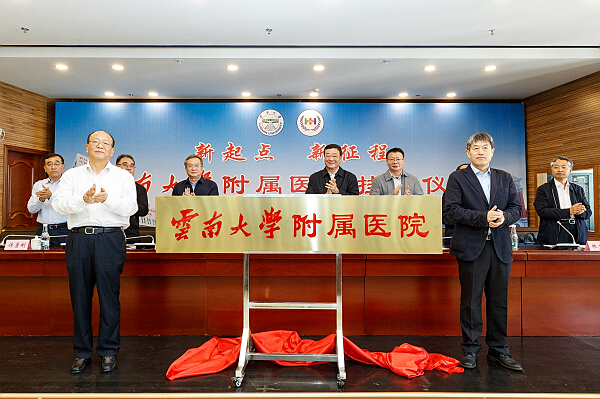New affiliated hospital added to YNU

Leaders unveil the plaque of the Affiliated Hospital of Yunnan University. [Photo/ynu.edu.cn]
In order to further promote the "double first-class" construction of Yunnan University (YNU), as well as promote innovations through medicine, teaching, and research collaboration, the Second People's Hospital of Yunnan Province officially became the affiliated hospital of the university, serving as a department-level public welfare department of YNU.
After the hospital is placed under the management of YNU, the university will be responsible for its personnel, finances, and materials. The university will also assume management of the hospital's medical education and research.
The Yunnan Provincial Health Commission will guide and support YNU and the hospital in developing medical talents. It will also guide innovations in medical, teaching, and research collaborations, as well as support the construction and development of the hospital.
The Yunnan Education Department will lead and support YNU and the affiliated hospital to carry out its medical discipline construction, medical talent training, and its maintenance of medical professional settings. It will also support the hospital to develop the cultivation of masters and doctoral students in clinical medicine.
Fang Jingyun, president of YNU, said at the unveiling ceremony that the university will focus on discipline construction, talent training, scientific research, social service, resource guarantees, as well as system and mechanism innovations to make the affiliated hospital a first-class hospital with comprehensive strengths and distinctive characteristics.
Xu Yong, Party secretary of the Yunnan Provincial Health Commission, noted that the department will provide guidance and services for the construction and high-quality development of the affiliated hospital of YNU to help improve its academic level and influence.
The newly added affiliated hospital will help to make up for the shortcomings of the discipline structure of YNU, as well as promote the coordinated development of the school's medical education and research. It will also improve the training level of medical personnel, as well as YNU's scientific and technological innovation capabilities.
It is also conducive to further integrating high-quality educational resources and health resources, improving the social service capabilities and levels of YNU and the hospital, as well as promoting the development of Yunnan's health industry and education.
In the future, YNU and its affiliated hospital will build an eight-year undergraduate-doctoral integrated training model for clinical medicine, as well as establish a Life Sciences and Medicine Division based on its resources in life sciences, pharmacy, chemistry, and medicine.




